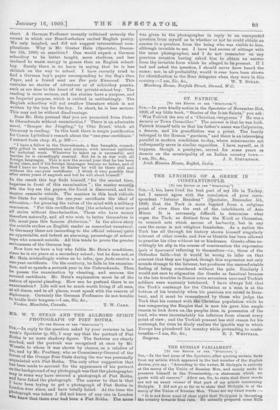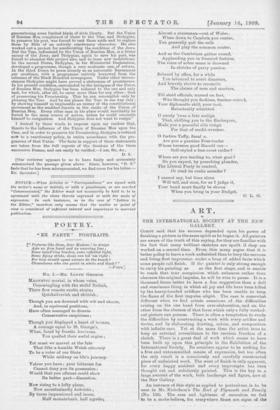THE RUSSIAN PARLIAMENT.
[To THE EDITOR OF TUE " SPEC rat TOR." J Sin,—In the last issue of the Spectator, after quoting certain facts from my article which appeared in the last number of the Englislt Review, you say "According to the writer, M. Stolypin is entirely at the mercy of the Union of Russian Men, and merely seeks to preserve himself in the Promiership,—a statement which we quote with all resorvo." Allow me, Sir, to state that those words are not an exact resum4 of that part of my article concerning Stolypin. I did not go so far as to state that Stolypin is at the mercy of the Union of Russian Men. Those are my exact words :—
"It is not from want of clear sight that Stolypine is thrusting the country towards final ruin.. He actually prepared some Bills
guaranteeing some limited kinds of civic liberty. But the Union of Russian Men complained of these to the Tsar, and Stolypine, to preserve his post, was forced to cast them aside and to replace them by Bills of an entirely reactionary character. He also worked out a project for ameliorating the condition of the Jews. But the Tsar, influenced by the Union of Russian Men, is a bitter enemy of the Jews; and Stolypine, again to save his post, was forced to abandon this project also, and to issue new restrictions. In the second Duma, Stolypine, in his Ministerial Deelaration, developed a programme, though a very moderate one, of reform. In the third Duma he poses already as an autocratic Bureaucrat par excellence, with a programme entirely borrowed from the columns of the Black Hundred newspapers. Under other circum- stances Stolypine might have proved a statesman of prominence. In his present condition, surrounded by the intrigues of the Union of Russian Men, Stolypine has boon reduced to the one and only task, for which, after all, he cares more than for any other: that of preserving his Premiership- This ho can accomplish only by pleasing the Tsar. And he can please the Tsar in one way only : by showing himself as implacable an enemy of the constitutional movement as the maddest fanatic in the ranks of the Union of Russian Men. Every other man in his place would inevitably be forced to the same course of action, unless he could reconcile himself to resignation. And Stolypine does not want to resign."
I desired by these words to impress upon my readers that, thanks to the influence of the Union of Russian Men upon the Czar, and in order to preserve his Premiership, Stolypin is reduced no* to a reactionary policy, in entire accordance with the pro- gramme of that Union. The facts in support of these statements are taken from the full reports of the Sessions of the three successive Dumas, and can easily be verified.--I am, Sir, &c., D. S.
[Our reviewer appears to us to have fairly and accurately summarised the passage given above. Since, however, "D. S." feels that he has been misrepresented, we find room for his letter,— ED. Spectator.]





































 Previous page
Previous page